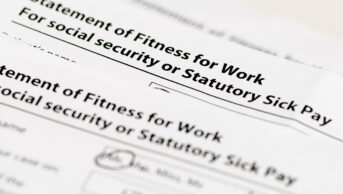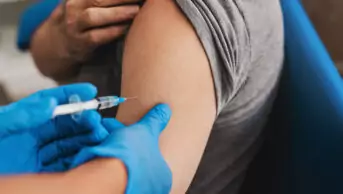
Shutterstock.com
A “bureaucratic” electronic referral system is preventing more GP practices from referring patients to the Community pharmacist consultation service (CPCS) in England, a leading GP has claimed.
The CPCS, in which patients are referred from general practice to community pharmacy for a same-day consultation with a pharmacist for minor illnesses, such as acne, constipation or vaginal discharge, was rolled out nationally in November 2020, following a pilot that began in July 2019.
However, it has seen low take up by GPs. As of October 2021, a report from the Royal Pharmaceutical Society (RPS) said that just 862 out of more than 6,500 GP practices were using the service.
However, financial incentives in the form of the ‘Winter access fund’, announced by NHS England on 14 October 2021, called for all practices to sign up to the scheme by 1 December 2021 and may have since increased this number.
The ‘Winter access fund’ offers practices £250m to help with winter pressures, with participation in the CPCS “a condition of a practice being able to benefit” from the fund.
Speaking at a meeting of the All-Party Parliamentary Group (APPG) on Pharmacy on 1 December 2021, Richard Vautrey, former chair of the British Medical Association’s (BMA) GP committee, explained the CPCS referral system’s “bureaucratic process is putting practices off engaging in this arrangement”.
The process requires that GP receptionists or “care navigators” go through a checklist of symptoms, and, if appropriate, refer the patient electronically to the pharmacy the patient has chosen.
“Sitting with my practice staff who are doing this now, it’s taking them potentially ten minutes to work through the individual referrals,” Vautrey said.
“So, when the patient rings up [the GP surgery] — and it’s quite clear from the first comment that the patient makes that this particular problem could be dealt with more appropriately by a community pharmacist — it’s then taking a significant amount of time to work through that referral for it then to be sent off to the community pharmacist.”
He explained that referrals through the previously commissioned minor ailment scheme, which was phased out by March 2020, were “so much simpler”.
“[The minor ailments scheme] was literally: ‘Yes, this problem can be dealt with by the pharmacist across the road or next door and this is where you can go to get it’,” he continued.
The minor ailments scheme was introduced in 2008 and was designed to provide free NHS treatment for minor illnesses, such as colds, allergies and minor skin conditions, at pharmacies to avoid the need for a GP consultation.
The Pharmaceutical Journal revealed in 2018 that one fifth of minor ailments schemes had closed in the preceding three years, with the scheme later closing in London in March 2020.
Alastair Buxton, director of NHS services at Pharmaceutical Services Negotiating Committee (PSNC), said that in the PSNC’s regular discussions with the BMA’s GP committee, “we have heard that the [CPCS] in its current form is bureaucratic for GPs and can take up significant admin resource”.
“It would be better if GPs could informally refer patients to a pharmacy, with all patients being able to access the service just by walking straight into their local pharmacy. We will continue to seek such a walk-in approach to the service in our discussions with NHS England and Improvement and the Department of Health and Social Care.”
Thorrun Govind, chair of the RPS’s English Pharmacy Board, commented: “Streamlining CPCS referral pathways to make it easier for patients and staff was a key finding of our recent workshop with the Royal College of GPs, BMA and pharmacy teams.
“With continued pressures across the health service, we hope the workshop recommendations can be taken forward with the NHS and other key partners to make the CPCS a success.”
A report from the RPS and RCGP, published in November 2021, recommended the GP referral system “fit into their current triage systems and pathways to ensure their teams didn’t have to learn additional/different IT systems or processes”.
It added that the government should develop an independent prescribing service for community pharmacists in England, to expand their role in managing minor illnesses, in a similar model to the ‘Pharmacy First’ scheme in Scotland.
What is the ‘Community pharmacist consultation service’?
The ‘Community pharmacist consultation service’ (CPCS) launched in October 2019, replacing the ‘NHS urgent medicine supply advanced service’ and ‘Digital minor illness referral service’ pilots.
In the initial phase of the services, patients were referred from NHS 111 to community pharmacy for free advice or an onward referral, with patients also able to pay for over-the-counter medicines.
In November 2020, the service was expanded to include referrals from general practice. However, uptake from GPs was slower than expected, with some local pharmaceutical committees receiving extra funding to increase GP referrals.
Data from NHS England showed that 340,000 patients had been referred from NHS 111 as of June 2021, while GPs had referred 13,000 patients to community pharmacies since the service began.
The service has also failed to bring in the promised levels of funding. It had been expected to bring in around £4m in 2019/2020 and £9m in 2020/2021, with pharmacists paid £14 per consultation; however, the low uptake meant the projected funding levels were not reached.
Data published on 28 October 2021 by NHS Business Services Authority show that community pharmacies earned just £1.9m through the CPCS in 2019/2020 and £5.3m in 2020/2021.
Nevertheless, there could still be further opportunities for the number of referrals to increase as nine areas began piloting referrals from urgent treatment centres, such as emergency departments, in November 2021.
Read more: Learning resources on minor ailments


